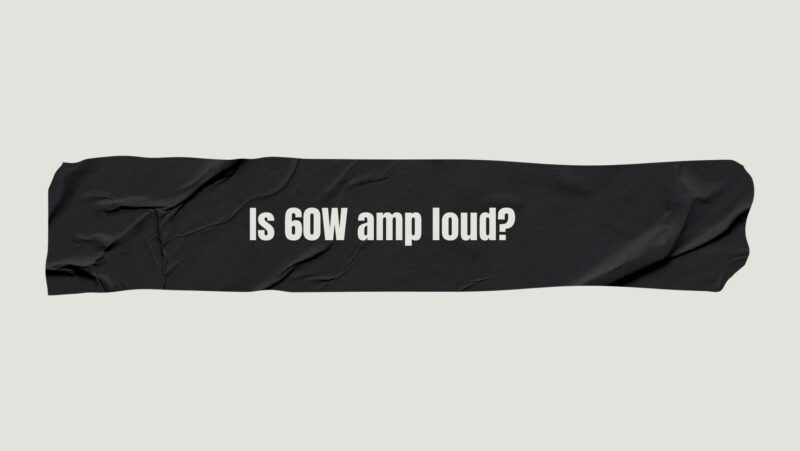The world of audio is a realm where power and perception dance in harmony. The question of whether a 60-watt amplifier is loud enough is one that has echoed through the minds of audiophiles and enthusiasts. Amplifier wattage is often associated with the potential volume a system can achieve, but the reality is far more nuanced. This article delves into the intricacies of amplifier wattage, focusing on the case of a 60-watt amplifier, to shed light on its audibility, considerations for real-world scenarios, and the interplay between power and loudness.
Understanding Amplifier Wattage
Amplifier wattage, measured in watts (W), is an indicator of the electrical power an amplifier can deliver to speakers. It’s crucial to realize that while wattage is a key factor in determining potential volume, it doesn’t directly translate to loudness. Other factors, such as speaker sensitivity, room acoustics, and the content being played, all contribute to the perceived loudness.
The Audibility of a 60-Watt Amplifier
- Indoor Settings: In a typical indoor setting, a 60-watt amplifier can certainly provide substantial volume levels. Whether it’s for personal listening, a small gathering, or even a moderately sized room, a well-designed and efficiently paired 60-watt amplifier-speaker combination can deliver satisfying sound without strain.
- Outdoor Environments: Outdoors, factors like open spaces and ambient noise can challenge the audibility of a 60-watt amplifier. In quiet outdoor settings, such as a serene park, a 60-watt amplifier can still create an enjoyable listening experience. However, in noisy environments, larger crowds, or outdoor events, the same amplifier might struggle to compete with the ambient noise.
- Music Genre and Content: The type of music being played greatly impacts the perception of loudness. Music with a wide dynamic range and intricate details might require more power to maintain clarity, while music with a consistent volume level might seem loud enough with a 60-watt amplifier.
Room Acoustics and Speaker Sensitivity
- Room Acoustics: The acoustic properties of a room significantly influence the audibility of an amplifier. A smaller room with sound-reflecting surfaces can amplify the perception of volume, while a larger room with sound-absorbing materials might require more power to fill the space effectively.
- Speaker Sensitivity: Speaker sensitivity refers to how efficiently a speaker converts electrical power into sound output. More sensitive speakers require less power to achieve a certain volume level. A speaker with higher sensitivity can make a 60-watt amplifier sound louder compared to a less sensitive speaker.
Real-World Scenarios
- Home Listening: For a home setup, a 60-watt amplifier can provide more than adequate volume for personal enjoyment, movie nights, or even small gatherings. It can reproduce the nuances of music and dialogue without distortion, especially when paired with speakers of appropriate sensitivity.
- Studio Monitoring: In a studio environment, where accuracy and clarity are paramount, a 60-watt amplifier can deliver precise sound representation at controlled volume levels, allowing producers and musicians to critically evaluate recordings.
- Live Performances: In live music scenarios, the suitability of a 60-watt amplifier depends on various factors. For an intimate acoustic performance, it can offer ample volume. However, larger venues or genres demanding high sound pressure levels may require more powerful amplification.
Factors Beyond Wattage
- Amplifier Quality: The build quality, components, and design of the amplifier influence its performance. A high-quality 60-watt amplifier can provide better sound reproduction than a mediocre higher-wattage counterpart.
- Speaker Quality: The quality of the speakers being driven by the amplifier is equally crucial. High-quality speakers with the right sensitivity can maximize the potential of a 60-watt amplifier.
Conclusion
Is a 60-watt amplifier loud? The answer is a resounding “yes” in many contexts. It can offer satisfying volume levels for various indoor applications and even some outdoor scenarios. However, the loudness of a 60-watt amplifier isn’t a fixed measure but rather a dynamic interaction between wattage, sensitivity, room acoustics, and the nature of the content being played. In the grand symphony of audio, wattage is just one instrument, and its harmony with other factors ultimately defines the audibility and quality of the sound experience.


